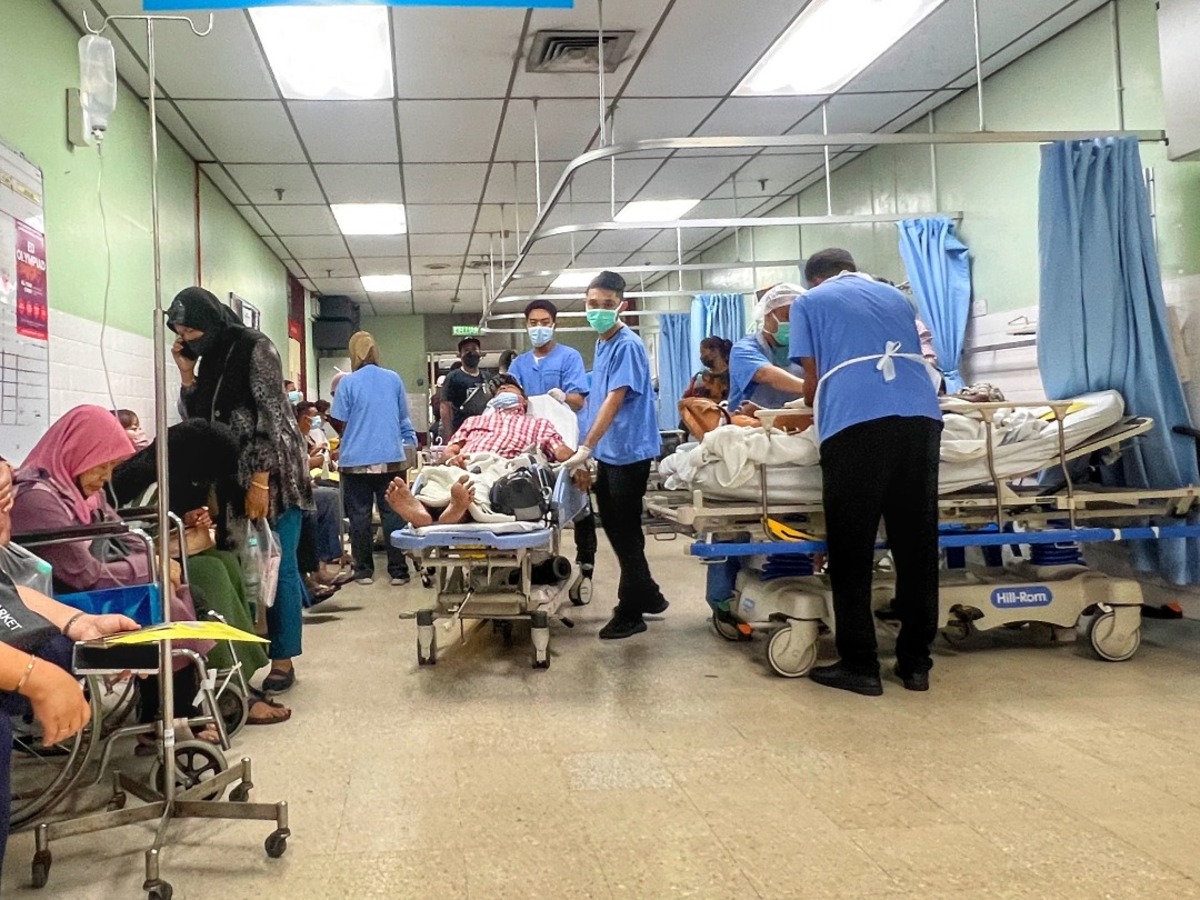KUALA LUMPUR, Dec 14 – Bandar Kuching MP Dr Kelvin Yii has urged the Ministry of Health (MOH) to audit the emergency and trauma departments (ETD) across all public hospitals in Malaysia.
The DAP lawmaker said this was crucial to identify if the heavy congestion at the ETD of Raja Permaisuri Bainun Hospital (HRPB) as reported by CodeBlue last Monday – where critically ill patients, including ventilated cases, are stranded for up to six days for ward admission – is isolated to the general hospital in Ipoh, Perak, or a nationwide problem.
“My suspicion is that it’s nationwide because of symptoms of underfunding and the post-Covid effect where for those who had been delaying treatment, their prognosis was affected,” Dr Yii told CodeBlue here yesterday at the sidelines of the Universal Health Coverage (UHC) Day Malaysia 2022 forum organised by NCD Malaysia.
Universiti Malaya infectious disease expert Prof Dr Adeeba Kamarulzaman tweeted Monday that she believes the crisis in HRPB’s emergency room is not isolated to the Ipoh tertiary hospital, but is happening across all major hospitals, including Universiti Malaya Medical Centre (UMMC).
Former Health Minister Dzulkefly Ahmad described the congestion in HRPB’s emergency unit as a “perennial” problem in government hospitals.
“I wouldn’t say it’s like a time bomb, but it’s almost like that,” Dzulkefly told reporters at the sidelines of the UHC forum here yesterday.
“We must have more rigorous intervening or mitigating measures to avoid that kind of scenario, that kind of outcome. The rakyat wouldn’t want to take it that way, especially Hospital Raja Permaisuri Bainun, which is a state hospital.”
Dzulkefly, who is Kuala Selangor MP, noted that government hospitals and public health clinics are reaching peak capacity, as he called for additional funding, human resources, and infrastructure to improve health systems and health care delivery.
“Otherwise, time and time again, we’ll be fire-fighting situations like this.”
Dr Yii suggested a short-term measure for HRPB, as well as other identified public hospitals with extremely overcrowded emergency departments, to outsource cases to private hospitals.
“Covid has shown there is a potential in public-private collaboration. We can decant certain patients to the private sector, where we have this unified health network,” said the former chairman of the health, science and innovation parliamentary special select committee from the 14th Parliament.
“I think this is the first step that can be taken. The second step, if really necessary, field hospitals with ICUs (intensive care units) have to be set up at the badly affected hospitals.”
During the Covid-19 pandemic, MOH estimated in August last year that about 15,000 non-Covid patients at public hospitals would be transferred to private hospitals by end 2021 for various surgeries and procedures. The outsourcing exercise did not include treatment and care for advanced chronic conditions.
HRPB doctors told CodeBlue that most of the severely sick patients coming to the ETD this year are presenting with non-communicable diseases (NCDs), such as heart disease, kidney failure, and stroke.
When asked if the Perak state government should have a role in contributing funding to decant HRPB patients to private hospitals, instead of just relying on the federal MOH, Dr Yii noted that the pandemic paved the way for collaborations across sectors on health care.
“I believe in a united health care network, with public-private, state and federal government. We cannot see health care as purely a federal issue anymore; I think the state has important roles to play.
“This is not merely on health care facilities alone. There’s the social determinants of health – a lot comes down to jurisdiction and autonomy of the state government.”
Perak state executive councillor in charge of health A. Sivanesan told reporters in Ipoh yesterday that HRPB administrators requested last April RM6.5 million in funding from the federal government for various upgrade works, especially for its emergency unit.
Sivanesan also said he has discussed the congestion issue in HRPB’s emergency department with the hospital director, Perak state health director, and health minister, but stressed that the problem cannot be solved “overnight”.
When asked if the HRPB emergency department case showed the lasting impact of the pandemic on the health care system beyond the acute phase of Covid, Dr Yii said more data was needed to answer this question, but cited preliminary observations about patients coming into the hospital sicker.
“Because patients are coming in sicker, it means patients have been neglected of their treatment, maybe defaulting treatment during Covid itself. In an ideal situation, a health system should be able to handle a pandemic on top of ongoing sick patients. So we have seen now that one was sacrificed for the other,” said the DAP lawmaker.
He said he will request in Parliament data from MOH on patient admissions post-Covid to see if there are huge spikes and what kind of cases are coming in.
“From there, we make policy decisions to address it and also allocate resources.”
HRPB’s internal statistics show that although outpatient arrivals across triage codes at the ETD this year, as of November, were 41 per cent lower than pre-pandemic 2019, the number of outpatient arrivals at the ETD’s Red Zone (Critical Zone) in 2022, as of November, is nearly equal to 2021 arrivals during the acute phase of the pandemic.
Dr Yii, a government backbencher MP, said although ideally, MOH’s budget for 2023 should be bigger than the RM36.1 billion proposed by the previous government, the distribution of funding needs to be more targeted.
When asked if he thinks the health budget may be less, Dr Yii replied, “I cannot say anything, but generally when budgets are revised, when you add something somewhere, you have to deduct something somewhere.
“I’m hoping, in the worst-case scenario, it stays what it is, but it has to be streamlined, properly distributed and properly used, and data-driven on what is the need in the coming years.”








